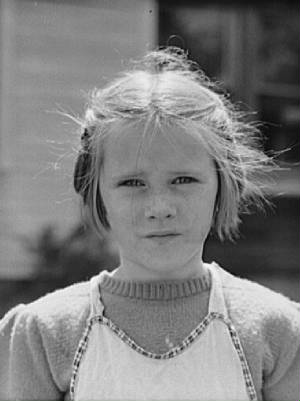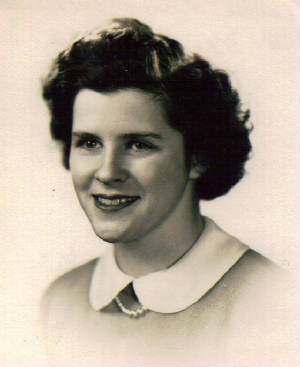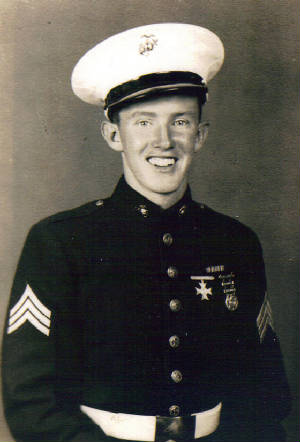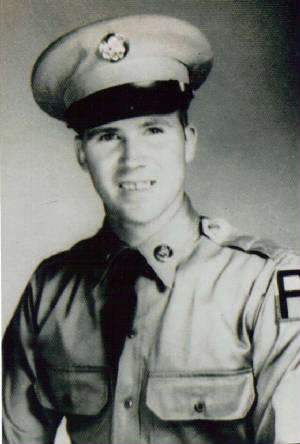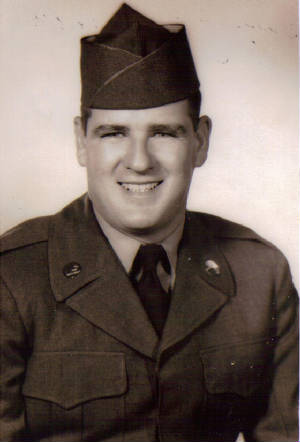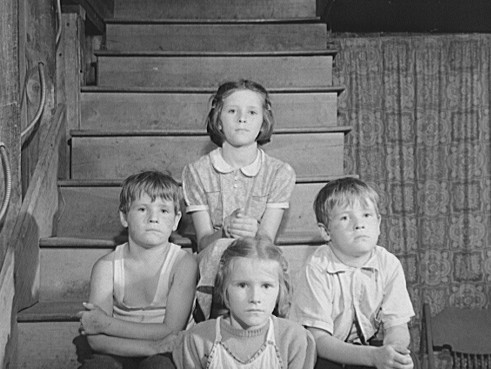
Jack Delano caption: Children of Warren Franklin, FSA (Farm Security Administration) dairy farmer near Guilford, Vermont, Aug 1941.
On the Library of Congress website, there are over 700 photos taken in the summer of 1941 by Jack Delano, for the Farm Security Administration. Vermont has a present-day image as a bucolic tourist destination, and a home for well-to-do people fleeing urban environments for an alternative, back-to-nature lifestyle. But the state is also known for its long history of rural poverty and struggling agricultural economy. So it isn’t surprising that the FSA would have brought its programs and its photographers to the Green Mountain State.
Three of Delano’s photos show some of the children of the Warren Franklin family, on their farm in Guilford, a small town in Windham County, near Brattleboro. The names of the children were not given in the captions. I quickly found several people named Franklin living in the Guilford area, and within a few hours, I was talking Wilfred Franklin, one of the boys in the photo above.
On March 8, 2008, I drove to Wilfred’s home in southern Vermont and interviewed him, his twin brother Alfred, and his sister Elaine Petrie. They were eager to share their memories, and full of good humor. It proved to be a very enjoyable visit. They even posed for a picture, 67 years after they posed for Jack Delano.
According to the family, Warren Franklin was born in Guilford on March 26, 1900. His first wife died of appendicitis in 1923. Their first child, Lawrence, was only nine months old. Several years later, Warren married Nancy Scranton, his first wife’s sister. She was born in Wardsboro, Vermont, on January 20, 1899. Warren and Nancy had six children: Gordon, Russell, Elaine, Glenice, and twins Alfred and Wilfred.
“I remember the apron. It was light green. I accidentally wore it to school one day, and I was so embarrassed. The teacher, who was my aunt Bertha, made me take it off, roll it up, and put it in my coat sleeve.” -Glenice Franklin Carter
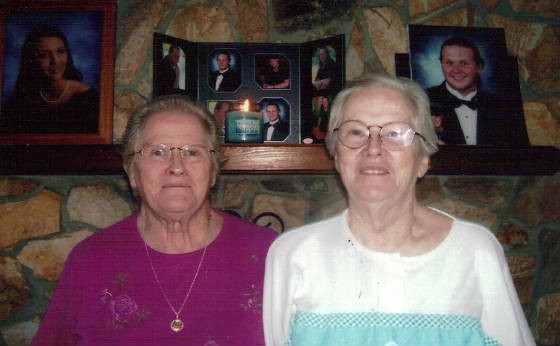
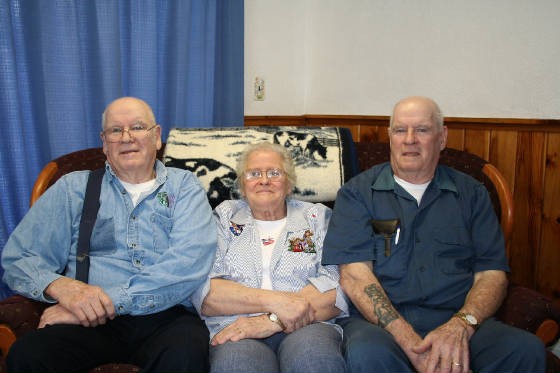
Edited interview with Elaine Franklin Petrie, Wilfred Franklin (Bill), and Alfred Franklin (Al), conducted by Joe Manning (JM), on March 27, 2008.
JM: What kind of situation were you in at the time the photos were taken?
Bill: Well, we didn’t have any money. We were milking a few cows, probably 10 or 15 cows, and we were building a barn at that time.
Al: My father started building a barn, but he never got it finished before we sold the farm.
JM: Where was the farm?
Bill: On Sweet Pond Road in Guilford. That where these pictures were taken. And then he bought the farm on Slate Rock Road in Guilford. It was 436 acres. There was not a building on it when he bought it. He cut down timber and built two barns, then he built the garage and the house.
Elaine: Do you remember the day Dad went and showed us that place? It was buried in snow, and I thought, ‘What a day to take your wife and kids to see a place you want to buy.’
Bill: That wasn’t the first time we’d seen it. We went there to get apples to make cider with.
Elaine: Yes, but when he took Mom to see it, the snow was up to her hips.
JM: Was the farm on Slate Rock Road the last one your father owned?
Bill: Yes.
JM: What did you do on the farm?
Bill: It was a dairy farm. We milked about 60 cows. We also had about 250 hogs at one time.
JM: How was he able to buy the farm? Is that when he got the loan from the Farm Security Administration?
Bill: He got the loan to build the barn on the first farm, but he only got it started. He was doing most of the work himself.
JM: Why did your father sell the first farm and buy the second one?
Bill: On the first farm, the fields were all on the side of a hill, with just two little patches, maybe two acres of land that was sort of level. And it was wet. It was a hard farm to work. We had a pasture that was a good half-mile away. We used to have go there to get the cows. We kids were doing that by the time we were five years old.
Elaine: During the hurricane in ’38, that wasn’t an easy job.
JM: But when he bought the new farm, where did he get the money?
Bill: Well, for one thing, there were no buildings on it, so it didn’t cost a whole lot. He had some money to start with. The county agent said he shouldn’t buy it, and the bankers wouldn’t loan him the money, but he had a friend that agreed to loan him the money.
JM: How much did the farm cost?
Bill: About $2,800.
JM: How much did he get for the first farm?
Bill: I’m not sure, but when he finally paid off the mortgage on the first farm, he had $1,400 left over.
Elaine: When we were kids, sometimes we didn’t have a car, and if Dad had a note due, he’d cut logs and sell them and then walk to town to pay off the note. He never would let it go over the due date. We were better off than a lot of people though, because we always had our own garden, our own beef and chickens and turkeys. During the war, we ate a lot better than most people.
JM: When did the farm stop being part of the Franklin family?
Bill: We sold it to a developer in 1971, for about $125,000.
JM: Did you think, after all that time, you made a profit?
Bill: Maybe a little, I guess. I made enough to build a house, and I owned it outright when I sold it.
Al: When my dad bought that place and we moved up there, the road was a mile and a half long, and we were the third house. They were all about a half-mile apart. The last count I had, there were 34 homes there. Some of them are back in the woods, but you can see most of them from the road.
JM: Do you folks remember the pictures being taken?
Elaine: No. I didn’t know about them till my son-in-law saw them in the Burlington (Vt) Free Press.
JM: What did you think when you saw them?
Elaine: I was pretty surprised. We didn’t get our pictures taken very often.
JM: Can you tell which one was Bill and which one was Al? You’re twins, and it might be tough.
Al: I’m guessing that I’m the one on the right.
Bill: I wouldn’t think so. I always weighed 10 pounds more than you.
Al: It wasn’t quite 10 pounds at that time.
Elaine: Al was the scrawny one.
Al: I really don’t know. They both agree I’m wrong.
JM: Are you guys identical twins?
Elaine: When they were born, Al had a brown mole on his left elbow, so to tell them apart, Mom had to look at the elbows.
JM: Your sister Glenice lives in Georgia. When did she leave Vermont?
Bill: In 1957. Her husband got a job down in Georgia.
Elaine: She moved the day Dad had a big beef barbeque.
Bill: I was home from the service.
Elaine: I got married in 1951.
JM: Did you have a job after you got married?
Elaine: I worked in the office at Dunham Brothers (shoe manufacturer) till I was married, and later I was an inspector for American Optical for 15 years, and then I was a Tupperware manager for another 15 years. When the kids were little, I waitressed for short periods when we got low on money.
JM: What about Glenice?
Elaine: She worked at a cotton mill during high school and a few years after. She’s had a few jobs since then, I guess, but her husband traveled a lot, and they had six kids.
Al: I continued to be a farmer till I was 50. Then I went into selling real estate. When I retired from there, I needed a little something to do, so I delivered sandwiches for five years or so. I got married and have four kids, eight grandchildren, one great-grandson and one on the way.
Bill: When I stopped farming, I ran a slaughterhouse; and for 17 years, I worked for the town of Leyden (Mass), 14 years as highway superintendent.
JM: Was it a good life growing up on the farm?
Elaine: Oh, sure.
JM: What made it good?
Bill: Everything. You had to get out and work, but that wasn’t so bad.
Elaine: My parents were always home.
Al: You have a lot more freedom than you have when you live in town. It wouldn’t be anything for us to take off and go to the neighbors a few miles away. Back then, you could walk the roads and nobody would bother you. You just thought nothing of it. Those were good times. We weren’t rich in money, but we had everything we needed. We always had shirts on our backs, shoes on our feet, and a bellyful of food.
Bill: According to one of those pictures, we didn’t always have shoes on our feet.
Al: Yes, but we could have if we’d wanted to.
Elaine: Bill and Al and Glenice used to go around with their arms around each other singing, ‘Friends, friends, love each other.’
Al: My mother said she never saw three kids play together as well as we did. But I’ll tell you one thing about Glenice. She’s the only person I ever saw that could hit you with both fists, kick you with both feet, and bite you all at the same time and not fall down.
Elaine: I want to tell you something else about Glenice. Her goal for a number of years was to go to every state in the country. Last year, her daughter took her to Hawaii, and her son gave me a ticket, so I went, too. That was her 50th state. She went to Alaska when she was suffering from polymyositis, a disease of the muscles. She could hardly pick up her feet, but she flew up there and even went dog sledding. She’s got more grit than anyone I ever saw in my life.
JM: When people look at these Farm Security Administration photos now, they are going to make some assumptions about who the people were, what they might have been like, and what kind of life they had. When I look at these photos, I make assumptions, too, but when I’ve contacted some of the families, I’ve found that many of my assumptions were not correct. That’s what makes this project so interesting.
Elaine: What did you assume about us?
JM: I’m getting a little more careful about making assumptions. I guess I assumed that you were poor, and that’s why you were getting the loan. I thought you looked fairly well dressed, which might mean that your mother got you to dress in better clothes, because she knew your picture was going to be taken.
Elaine: It was probably what we were usually wearing then. I don’t think she knew that our pictures were going to be taken. If she had known, the twins’ feet wouldn’t have been dirty, like you see in the picture.
Bill: We had patches on our clothes then, but we didn’t go around with holes in our clothes.
Elaine: I used to get three dresses for my birthday every year, from my two aunts and my mother’s best friend. That helped a lot. Mom used to always be sugaring in March, so she’d boil the syrup. I remember one time I put on a new dress, and I went to the sugar house to show it to her, and I fell flat on my face in the mud and ruined the dress.
JM: If your father was a young man now, and he wanted to be a farmer in southern Vermont, and he didn’t have much money, would it be possible for him to buy some land and have a successful farm?
Bill: I think it could be done, if he’s a good enough manager.
JM: But he would have to buy land. With all the development around here now, hasn’t that driven up the price a lot?
Al: I don’t believe there are any cows that can pay for the land it takes to feed them. The only exception would be if the land trust buys the development rights, then it will lower the value of that land, and enable some farmers to afford it. I was on a land use subcommittee for the Rural Development Commission. They were trying to preserve the farmland, by zoning it so that it could only be sold as farmland. I said they couldn’t do it, because farmers don’t accumulate a lot of money. Their retirement is their farm. If they can only sell it as farmland, that cuts the value in half. I told them: ‘Many of you work for the government. You’ve got retirement plans. When you get ready to retire, would you be happy if the government told you that you only needed half of that money, so they were going to take the rest? You’re trying to do the same thing to the farmer.’
JM: In your parents’ case, it looks like things worked out pretty well.
Al: I think you could say that the whole family of seven kids turned out reasonably successful. Most of us aren’t rich, but we’re all getting by well. I can give my parents some credit for that. My father had a work ethic and honesty, and we were brought up that way, and fortunately, we’ve passed it on to our kids.
“All five boys served in the military, and we were all very proud of them.” -Elaine Franklin Petrie
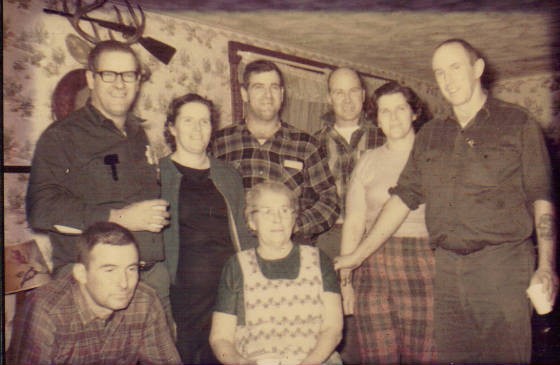
Clockwise from Nancy: Gordon, Alfred, Glenice, Wilfred, Russell, Elaine, Lawrence
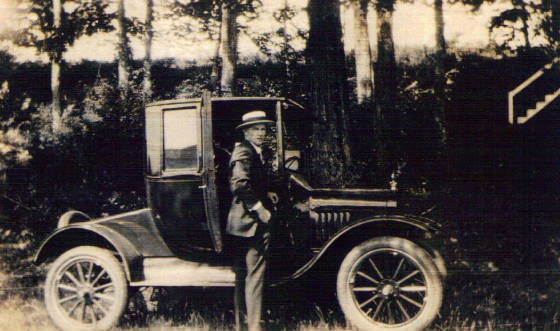
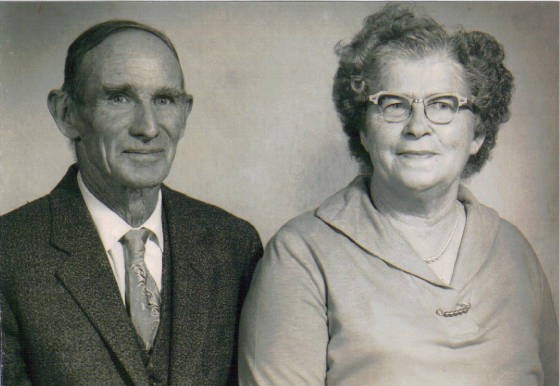
Warren Franklin passed away April 16, 1967. Nancy Franklin passed away October 9, 1968. During their retirement, they spent the winters in Arizona.
*Story published in 2008.

